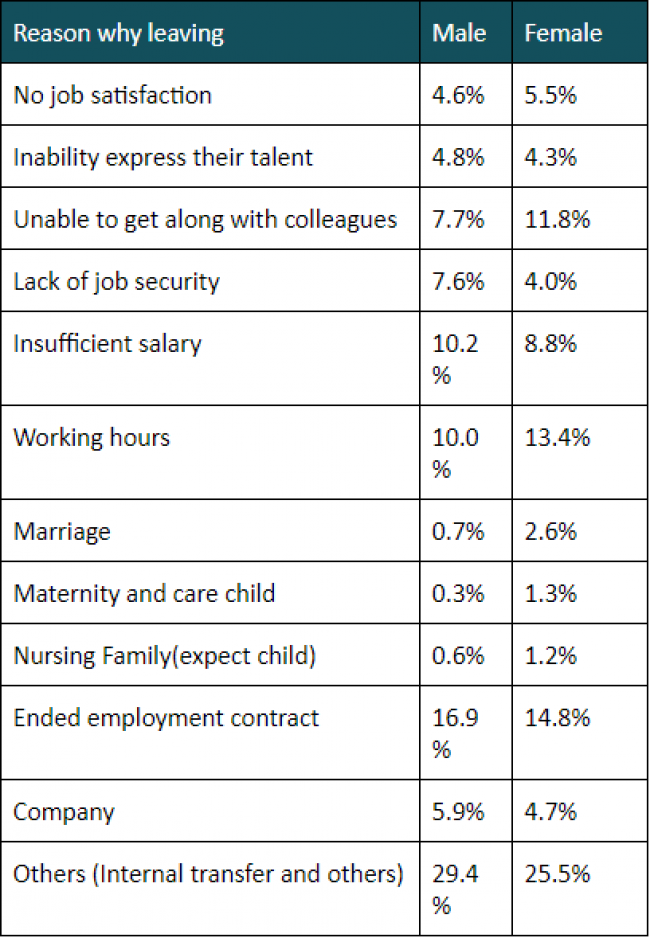 コラム
コラム
Do Japanese never change their jobs?

Do Japanese never change their jobs?
That is not true!
Many Japanese change their jobs during their career growth. But many business leaders are struggling in the hiring process as they believe the underlying reason that Japanese never change their job. In this article, I will be discussing the rate of job switch in Japan through supporting data.
Let's take a closer look at job switch in Japan through these three behaviours by employees and the companies.
1. Survey on Employment Trends in 2018
2. Life experiences of Japanese employees
3. Suggestion for hiring companies
(1) Survey on Employment Trends in 2018
Here are some highlights from the Employment Trend 2018 report by Ministry of Health, Labour and Welfare:
・ 10% of full-time employee has made a job switch in the last 12 months
・ Top two reasons for making a switch: end of a contract and overall working condition,
including the work hours and remuneration.
The following table illustrates the importance given to different reasons by gender for leaving a job.

*Table developed based on the information obtained from the Survey on Employment Trend in 2018 reported by Ministry of Health, Labour and Welfare.
(2) Life experience of Japanese employees
Voice of Mr A (switched jobs two times)
Let's take a look at two types of career experiences by two different Japanese in their 30's. Both employees (Mr A and Mr B) are graduates with over 10 years of working experience. Interestingly, both have a different approach to how they crafted their career path.
From my first job, I changed to another company after a year from when I began. My seniors advised me to complete three years before I can make a change. However, the company and I did not share the same level of enthusiasm that resulted in a lack of job satisfaction within me. This triggered my job hunting process, and I moved onto my next role. In my future role, I was able to express my talent comfortably, which recognised by the organisation. With more substantial employee recognition, I stayed on for four years in the company before making the next change.
In my second chance, I moved onto a multinational company where I was given a 20% hike in my salary package, and I experienced a flexible work environment. In this role, I was required to converse in English to a large extent which initially came as a challenge. As I like roles that challenge me, I took this up confidently and used this to my stride to prove my capabilities.
What's next? With plans to get married and start family planning, I am looking forward to a role which can support work-life balance.
Voice of Mr B
I have not experienced job change throughout my career. During this period of 10 years, I have experienced the typicality of working under a stiff environment, including the unreasonable boss, power harassment, and unpaid overtime. During extreme work stress periods, I have initiated a job search via online job portals, but I did not make a final move to change my current job.
There advantages though in my current company has given me a level of job satisfaction that has kept me going over these years. Benefits entail higher salary package, employee benefits and the strong brand identity in the industry. While salary benefits were encouraging my stay, I was not ready to make a risk-taking move to switch to another company. I preferred staying in the comfort zone that allowed me to continue with my job security.
So, what's next? After 10 years from when I have started work, I continue to check on some new jobs via the online portal to understand more about the industrial standards. However, I remain aware of my nature and the industry, and I do not intend to switch into another role. I genuinely believe that my long-term service will get recognised.
(3) Suggestion for hiring companies
Lifetime employment system ended more than 20 years ago in Japan. There are now various reasons that support for switching a job by a Japanese.
In the case of Mr A, he was determined to build his career through tasks that challenge him at the same time justify his hard work through the remuneration package. Mr B built his career by configuring himself to how the company was functioning.
The frequency of job-hopping can be a little less compared to other countries. And it is clear that most of the Japanese change job to look for better benefits and working environment based on the employee survey.
Are you interested in attracting the right talent for your company? Audit and re-evaluate your company culture and the benefits offered by your company.
Message me for any questions or ideas for hiring in Japan.
